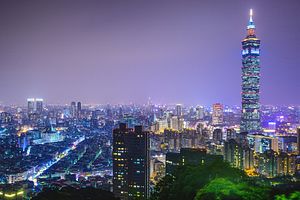An outright military conflict between Taiwan and mainland China may no longer be the single biggest threat to security in East Asia, but the veritable tsunami of capital, goods and people from the People’s Republic to Taiwan is increasingly seen as a de facto takeover of the island nation by mainland China. Taipei may have believed that ever-closer economic ties to mainland China would be an effective way to get back on track for growth, but integrating itself more tightly with the emerging networks of global trade is critical for its political as well as economic future. The question is whether the international community can accommodate Taipei and how.
Walking along the streets by the glitzy Taipei 101 building, the Taiwan’s decision to improve relations with its neighbor is all too apparent. For the bulk of demand for boutiques offering the latest designer handbags and wine bars catering to the most discerning of tastes is being driven by Chinese tourists. In fact, mainland Chinese make up the single biggest group of visitors to Taiwan, reaching nearly three million last year, thanks to a multitude of direct flights between the two sides available daily since 2009. It is in fact money from the People’s Republic that is driving the capital’s veneer of glamor, given that the Republic of China’s GDP growth rate has dropped to below 3 percent in recent years, compared to over 7 percent up to the mid 1990s.
While Taiwanese President Ma Ying-jeou’s conciliatory approach to the PRC and signing of the 2010 Economic Cooperation Framework Agreement in particular has been seen as one way to jump-start sagging demand, it has proved to be a risky political gambit for the president’s survival. Growing concerns about cross-strait economic relations becoming an increasingly one-way street, with the bulk of the gains going to China have shown no signs of waning. Protesters took to the streets earlier this year to object to the Cross-Strait Service Trade Agreement, fearing that Beijing would increase its influence as 64 Taiwanese sectors and 80 mainland Chinese sectors were opened up.
Already, increased Chinese economic presence has led to a surge in Taiwanese real estate prices. Even though there are numerous barriers confronting Chinese nationals wanting to purchase Taiwanese properties outright, there are enough loopholes in the system that they can invest in real estate on the island. Some analysts estimate that real estate prices have increased by more than 200 percent over the past decade as a result of Chinese intervention, making it increasingly difficult for Taiwanese workers to buy their own homes.
Meanwhile, more and more Taiwanese are being lured by the economic opportunities of China and leaving the island for the mainland. According to a poll by 104 Media this summer, 80 percent of Taiwanese under the age of 30 would be willing to move to the People’s Republic of China given the higher pay and better benefits.
Yet worries about the impact of China’s foothold across the strait should not be limited to Taiwanese voters. For the United States too, the increasing economic isolation of Taipei despite the surge of global trade pact is a security concern as much as an economic one. For instance, Taiwanese policymakers from both the ruling KMT Party and DPP are looking to joining the Trans-Pacific Partnership agreement once the deal is signed as a means to jump-start its sagging economy, especially as Beijing is unlikely to be able to meet the high standards required for membership, unlike Taipei. The problem, though, is that the outlook for a timely conclusion is facing increasing difficulties given that U.S. government representatives have their hands tied due to the ongoing Capitol Hill deadlock. But not only is stalling on approving Trade Promotion Authority diminishing U.S. credibility among the 11 other member nations of the TPP, it is actually hurting Taiwan’s economic outlook which is banking on joining the pact once it is approved. For the island’s growth remains heavily dependent on exports, even as its share in global trade has fallen nearly 30 percent from its peak in 2000.
At the same time, alternative regional trade agreements such as the Regional Comprehensive Economic Partnership agreement is out of bounds, given that China is taking a key role in its development and would consider Taiwanese membership as moot. Meanwhile, China is boosting its ties to South Korea as prospects for a bilateral trade deal between the two countries continue to be negotiated. That, in turn, would make it more difficult politically for Seoul to deepen its trade relations with Taipei.
In short, becoming a TPP member is the best hope for Taiwan to be able to break out of its economic doldrums, but that ultimately depends on how quickly and effectively the pact is put in place.
Much rides on Congress acknowledging the urgent need for the world’s most ambitious trade deal to become a reality. Not only is the credibility of the United States as a reliable economic partner at stake, but Washington’s decisions will ultimately impact the economic health of Taiwan, an island of democracy in a region that is facing ever-increasing tensions. A swift passing of TPP and encouraging other governments to join the regime is key to ensuring the preservation of Taiwan’s political as much as its economic identity.
Shihoko Goto is the senior Northeast Asia associate at the Woodrow Wilson International Center for Scholars’ Asia Program based in Washington DC.

































